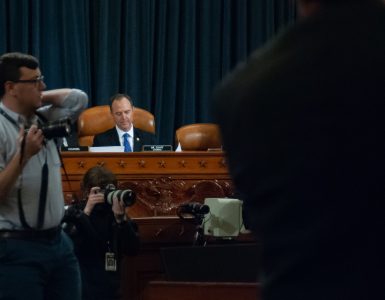Donald Trump’s presidency has forced reporters and news organizations to adopt more rigorous fact-checking methods, respond faster to developing news and push back against misinformation, veteran journalists say.
House Speaker Nancy Pelosi, D-Calif., ignited a media firestorm on Sept. 24 when she launched a formal impeachment inquiry of Trump’s actions. A rough transcript of a phone call released Sept. 24 showed Trump asking Ukrainian President Volodymyr Zelensky to investigate his political rivals.
The impeachment proceedings have dominated the news cycle of organizations such as CNN, Fox News, The Washington Post, and the New York Times. CNN has a section of its website dedicated to impeachment news and columns. Fox News does as well.
News outlets can, and should, focus on the impeachment proceedings as much as possible, experts say.
‘Barrage of misinformation’
Margaret Sullivan, media columnist for The Washington Post, said in an interview with The Wash that it is important for journalists to fight against “a barrage of misinformation.” Reporters, she said in a phone interview, need to be “very, very well prepared.”
In a Sept. 27 column, Sullivan discussed how Trump, whom she refers to in the article as “the TV president,” has so far failed to spin coverage of the impeachment to his advantage.
“It’s about to get worse: Impeachment hearings are sure to flood the media zone with images and words that cannot make the president look good, despite the best efforts of his loyal defenders,” Sullivan wrote in the column.
A poll released by CNN on Sept. 30 showed that 47% of Americans are now in favor of impeachment proceedings, up from 41% in May.
Sullivan also said she believes that it’s important for journalists to push back on the spread of misinformation in their networks.
She pointed to instances such as CNN anchor Jake Tapper’s interview with Rep. Jim Jordan, R-Ohio, and 60 Minutes anchor Scott Pelley’s interview with House Minority Leader Kevin McCarthy, R-Calif. In both interviews, the anchors challenged pushed back at their guests. Sullivan said pushing back against anything that would “muddy the waters” is critical to coverage.
Fernando Pizarro, the Washington correspondent for Univision who also teaches as an adjunct professor at American University’s School of Communication, said this coverage is different from the Bill Clinton impeachment scandal in 1998-1999.
“Things are going very fast. We’re talking about something a lot different from 1999,” Pizarro said, referencing coverage of the impeachment of former president Clinton, which Pizarro covered for CNN Español.
Pizzaro associates the speed of news to the beginning of social media.
Viewer burnout?
Pizarro disagrees, however, with the concept of wall-to-wall coverage, saying that networks are now banking on their viewers being glued to politics. He fears there could be news fatigue, which happens when viewers burn out on a particular issue.
“Twenty-four-hour news networks, particularly at least one, spend too much time on politics,” Pizarro said.
Still, Pizarro pointed to events involving the Trump Administration — such as cabinet resignations and former Special Counsel for the Department of Justice Robert Mueller’s investigation into Russian interference in the 2016 presidential election — that helped prime the media for this kind of reporting.
“I think the media is pretty well trained to tackle impeachment at this moment,” Pizarro said.
Alicia Shepard, former NPR ombudsman, said accuracy is key in the fast-moving coverage. In 2006, Shepard wrote a book about journalists Bob Woodward and Carl Bernstein’s coverage of the 1972 Watergate scandal.
Shepard said that news organizations should avoid focusing only on polling — a mistake made during the 2016 elections coverage.
“Polls are a snapshot in time. They are often, and can be, wrong,” Shepard said.
She said journalists “cannot afford” to make mistakes in their reporting. “There is a need to be first,” Shepard said. “No one remembers who was first, they just remember who was wrong.
“The Trump Administration is, and rightfully so, going to be very good at capitalizing on those mistakes,” Shepard added. “All media can do is to be careful to be absolutely sure about the facts that they have and not be invested in the outcome.”
Photo by Kristen Johnson















Add comment